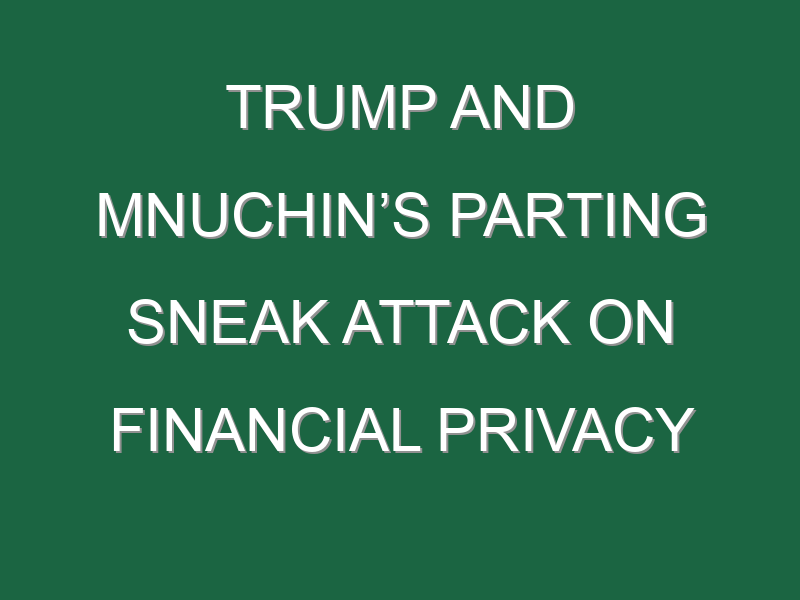Good morning, and welcome back!
That’s assuming, of course, that you’re among those lucky enough to have had an actual winter break, a moment of rest as we left behind the most trying year in living memory. That wasn’t the case for many of our readers, however, thanks to an 11th-hour regulatory push by the Trump Treasury Department to deeply undermine the entire cryptocurrency industry.
Treasury’s Financial Crimes Enforcement Network (FinCEN) has announced plans to radically revamp reporting requirements for anyone that sells or transfers virtual currency. Under the proposed new rule, which is part of efforts to control money laundering and financial crime, entities such as Coinbase would have to follow extensive new requirements to report some transactions, and details about participants, to FinCEN. That would include any transfer of more than $10,000 value, in line with current requirements for banks. More troubling, it would include anyone receiving a transfer of above $3,000, if it is transferred to a private cryptocurrency wallet (that is, one not hosted by an exchange or other financial institution).
In other words, the new rule would require companies to collect information about people who are not their customers, and may never have interacted with the company at all. It’s unclear how they or their customers could compel the recipients of funds to divulge that information, creating a massive barrier to their core function of moving assets. That’s just one of the many problems with the substance of the rule.
Content aside, the timing of the notice has been met with justified outrage by impacted firms. Not only was it announced on December 18, just as large parts of the professional world went into badly-needed hibernation, but the comment period was set at just 15 days after the posting. The normal comment period for rulemaking is 30 days or more, leaving the distinct impression that someone was trying to minimize notice of the … well, of the notice.
So instead of enjoying Kwanzaa/Christmas/Solstice/a prestige TV marathon, staffers at firms from Square to Kraken to Fidelity were left scrambling to file comments to Treasury about the new rule. The comments from industry (many of them collected here) are essentially uniform in their opposition. In its comment letter, Union Square Ventures said the new rule would “impose burdensome and unprecedented reporting and recordkeeping requirements on certain cryptocurrency transactions.” Andreessen Horowitz partner Kathryn Haun even argues that the rulemaking violates the Administrative Procedures Act because it is overbroad, and promises that if imposed, “a16z intends to join others in challenging it in court.”
CoinCenter, a nonprofit advocate for digital currency, unpacks some broader negative consequences of such a rule. The group’s research director, Peter Van Valkenburgh, allows that the $10,000 reporting requirement is at least “technology neutral.” But the $3,000 threshold for reporting transactions to private wallets, he argues, imposes a burden on an emerging technology not shared by legacy systems (no parallel rule exists for banks), and without any reasonable justification.
Moreover, the proposed rule would be a continuation of an approach to financial crime that already looks broken. As the Paradise Papers highlighted in 2017, reporting requirements for banks haven’t stopped criminal money transfers, and in fact may even have worsened them by providing banks with plausible deniability.
That makes the civil liberties imposition of the proposed rule hard to justify. Valkenburgh describes FinCEN’s reporting requirements in general as “a form of warrantless search and seizure of private financial records.” The digital civil liberties group Fight for the Future argues that “most people purchase cryptocurrency through an exchange before transferring it into a personal wallet. So this rule change effectively imposes strict financial surveillance on people who are participating in the crypto-economy for legitimate purposes, while having little-to-no impact on bad actors.”
And it’s not just a one-time imposition. Blockchain analytics firms like Chainalysis can trace sequences of crypto transactions on nearly any public blockchain, meaning that once a single wallet is linked to an identity, any subsequent transactions from that wallet can be linked back to an individual.
Furthermore, there are growing concerns that FinCEN’s records are a rich pot of personal data, mostly about entirely honest transactors. That concern should be even higher after the SolarWinds hack, in which Russian actors compromised the Treasury Department to a still-unknown degree.
Union Square Ventures partner Fred Wilson wrote on Tuesday that the whole package is “no way to regulate an issue at the very heart of a new open financial system that is poised to open access and massively reduce the cost of financial services for everyone.” That’s a fairly rosy assessment of the crypto sector, which has so far had fairly limited impact on the financial lives of everyday people.
And little surprise – USV’s investment portfolio includes a lot of crypto companies. Among them is Coinbase, for whom the new rule would be onerous, if not devastating. Even leaving aside personal freedom and privacy, those burdens on innovation make FinCEN’s new rule a potential giveaway to China, which is pushing hard on its own, decidedly unfree vision of digital currency as a path to geopolitical influence. That would be, if nothing else, a fitting final act for a Trump administration whose poor choices have already disastrously undermined America’s position in the 21st century’s most vital fight against autocracy.
There is some good news. In typical haphazard style, the Trump administration appears to have extended the comment period, at the last second and without clear public notice, by two days. The new deadline is midnight tomorrow, January 7. Interested parties can submit comments here.
And for those who feel passionately about this issue: CoinCenter is selling some shirts you might like that help support their work.
David Z. Morris





